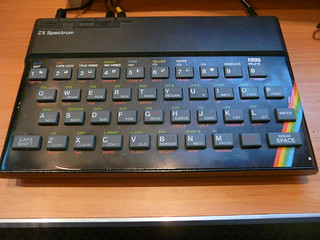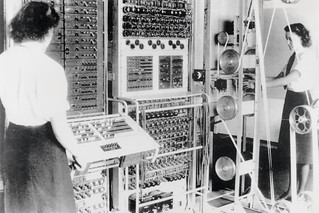What's my day looking like so far? Main item on my to-do list: don't die from the heat. My most-looking forward to item? Writing the latest issue of my newsletter.
Read MoreDeciding what ed tech to buy: who ya gonna call?
What does the latest research from Besa tell us about who schools listen to when it comes to ed tech product recommendations?
Read MoreWhere's the ed tech action? Maybe under your nose!
Not everything is a million miles away or up in the cloud, when it comes to education technology.
Read MoreWhy and how to become a teacher researcher
The classroom is a great place to conduct some research. Picture by Jordan Dreyer
In my opinion, every teacher should be a researcher, and I think that especially applies to teachers who have some degree of influence of what education technology is bought and used.
Why?
- It's important to know what's going on in your field. Imagine going to a doctor who last updated his knowledge ten years ago, or even one year ago.
- If you hope to convince the powers-that-be to spend more money on technology, you have to be able to prove that it works, or at least that it's likely to work.
- Research and reflection are good ways to improve one's teaching. The research part helps to avoid the 'echo chamber' situation in which you only know what's going on in your own school.
How?
- Read the research. This is not always accessible, either because of a paywall or because the language is too abstruse and abstract to be acted on quickly. Solutions:
- Check whether or not your status as an alumnus (assuming you have a degree) gives you access to academic journals online.
- Sign up to my newsletter, Digital Education. I often summarise research and review academic books in that, and it's free.
- Join the Association for IT in Education. Disclosure: I'm on their committee. You receive an academic journal called Technology & Pedagogy in Education, and that's worth a lot more than the subscription fee in my opinion.
- Attend conferences. A very accessible one in terms of cost, location, and down-to-earthness is Research Ed.
- Conduct research in your own classroom. You can do this even in a very quick and easy way:
- Know what the problem is you're trying to solve with the technology.
- Keep a note on what went well, what didn't go so well, and why.
- Get the kids' feedback too. I think having kids evaluate the technology is a no-brainer: they're the ones who are going to be using the stuff! I was pleased that John Galloway advocated this in a discussion hosted by the Guardian Teacher Network recently too.
- Read blogs. Some good ones to start with (apart from mine!) are:
- Plan B by Donald Clark
- EdTech Now, by Crispin Weston
- Learning with E's, by Steve Wheeler
Finally, do share your research and findings, whether from your own research or reading, with other people. If you haven't already done so, start a blog. Or share on Twitter or Facebook.
You might like my article, Education Technology research, and how it's reported
In case you became sidetracked earlier, here's the sign-up form for my newsletter, Digital Education:
Photo by Abel Tan Jun Yang CC0
8 conferences in the latest issue of Digital Education -- and a 50% discount!
8 conferences, and a whopping half price offer. What's not to like?
Read MorePhoto by Keem1201 CC0
EdTechX Europe Conference: special discounts
The EdTechX Europe conference is coming, and I've secured a 35% discount for readers of the ICT & Computing in Education website, and 50% off for subscribers to my newsletter, Digital Education. Read on for more details.
Read MoreGetting dressed for the occasion
Why taking advice on what to wear for a conference talk isn't always a good idea.
Read MoreWhat I've been reading: Everyday Sexism
I’ve just read Everyday Sexism [Amazon affiliate link] by Laura Bates. Before I go any further, I suppose I ought to explain why. What does this subject matter have to do with teaching computing and ICT?
Well, I don't think there can be any doubt about the fact that a lot of girls are put off going into computing, whether as a course in school or in their career choices. So I wondered how far the kinds of issues girls face in school, especially in subjects like computing which are seen by too many people as a male preserve, are part of a wider picture.
In many respects this book is pretty depressing. It's bad enough that grown women have to put up with unwanted attention, but children?!
I think girls and women would find the book useful, to help them realise that lots of others experience the same kind of thing. I think boys and men should read it too, to find out how it must feel to be on the receiving end of sexist comments.
One of the things that struck me was the complaint that male teachers say things like, "Come on, you don't want to be beaten by a girl do you?". I can see why girls would feel belittled by that sort of remark, even if it was intended as a lighthearted means of galvanising the boys into making a greater effort.
I remember doing the opposite: saying to the boys in my Computing class that I'd like them to be quiet and let the girls answer, as I'd rather listen to a well-thought out response than some half-baked comment shouted across the room. Was that unacceptable too, do you think?
Most of the book might be described as 'relentless': wave after wave of intrusive and even threatening comments. For me, the best chapter is the last one, because it portrays women as strong and powerful rather than as almost powerless victims.
In this context you might like to read my article, Where are the girls in ICT and Computing?
The book reviewer's desk, by Terry Freedman. For more book reviews, sign up to Digital Education, where this review first appeared.
Like to receive information about my newly-published books, and occasional special offers? Just sign up to my newsletter, Digital Education:
Enter a draw to win a book: The Power of Networks
The latest issue of the Digital Education has a load of stuff in it: book reviews, articles and a chance to win a copy of The Power of Networks.
Read on for more details, and a sign-up form.
Read MoreThe importance of reading in education technology: 3 books to read and recommend
Why background reading and reading around the subject are good things to do, plus three books I recommend for students (and teachers).
Read MoreGetting the most out of Education Conferences -- now available on Kobo!
Information about my ebook, Education Conferences, plus where to buy it on Kobo.
Read MoreOur lives in data: London transport
How is your travel data used, and what the trade-offs in terms of private costs and benefits? This is the second post in a series about data and privacy, and artificial intelligence.
Read MoreOur lives in data: privacy
How much data are you prepared to give away, and what are you prepared to allow organisations to do with it? The answers in my case surprised me.
Read MoreChatbots in education
Chatbots that appear to be emotionally intelligent are being developed. Imagine how useful they might be in schools.
Read MoreIllustration by Mary, CC0
Classroom research for the Computing and ICT teacher
It's a great idea to do classroom-based research, but here are 7 caveats to bear in mind.
Read MoreHalf Star, by Clker Free Vector Images CC0
21 points to consider when evaluating a resource
Here are 21 points to think about when evaluating a resource, plus suggestions of how to use the list in a team exercise.
Read MoreView from the terrace at the House of Lords, by Terry Freedman
Conference: Global Teacher Education Knowledge Mobilisation Summit
Teacher retention is an issue -- and that's an understatement. This conference will look at issues such as teacher motivation, professional development and education as a self-improving profession, to name just three.
It takes place on 4th May 2017.
Read MoreElephant, by Geralt CC0
Institutional memory and education technology
What is institutional memory loss, why is it important, and what can you do about it?
Read MoreWriter, by Waldryano. CC0 licence.
What I've been writing: articles around education technology: innovation, parental engagement, teaching programming and digital illiteracy
Here are links to a few articles I've written recently. They cover parental engagement, innovation, how to teach computer programming and, finally, "digitally illiterate and proud of it".
Read MoreWe should expect people in education be technologically literate.
7 suggestions for how to treat willful digital illiteracy in education
Why does digital illiteracy seem acceptable in education? I think we should have higher expectations, which I have expressed in these seven suggestions.
Read More



















I wrote and published this more than ten years ago (in 2014). Apart from the fact that some terminology has changed and some resources are no longer available, it is still relevant. What a sad situation.